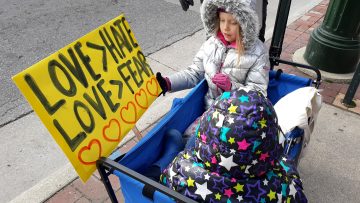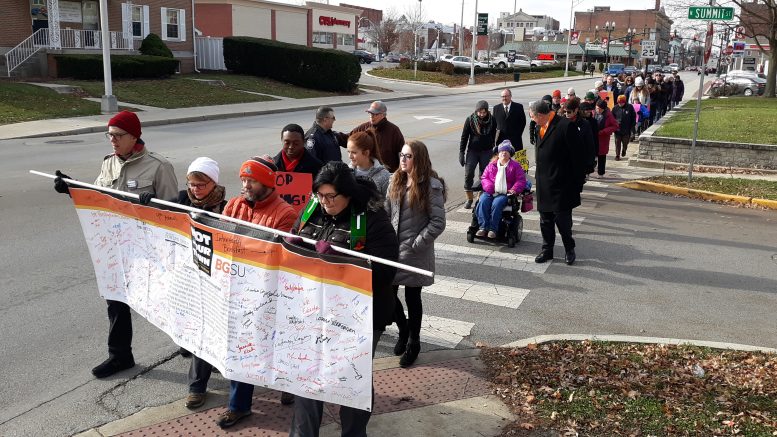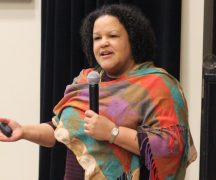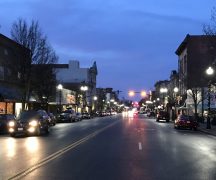By JAN LARSON McLAUGHLIN
BG Independent News
At 84 years old, Frances Brent had plenty of reasons not to join the Peace March on Wednesday from downtown Bowling Green to the Bowling Green State University campus.
But she wasn’t about to let the freezing temperatures stop her from making a statement.
“I’ve done this every year,” Brent said of the annual march. This year she was joined by her 33-year-old granddaughter, Natasha Anik, from Florida. “We really want to have a family tradition of showing our society can win if we keep working at it.”
Recently retired Jackie Dubler also didn’t have to bundle up for the march. But yet, she did.
“I believe in reaching out. I believe in peace,” Dubler said. “I believe the brotherhood of man transcends the sovereignty of nations.”
Rev. Mary Jane Saunders, who has walked in plenty of marches, could have sat out this one.
“I’ve been involved in peace marches most of my adult life,” she said. And now is not the time to stop, she added.
“It’s hard not to lose hope,” said Saunders, who heads the city’s Human Relations Commission.
“But we don’t stop,” she said. “Let there be peace on earth and let it begin with each one of us.”
The march grew as it made its way toward the campus, starting at about 50 people and adding another 25 or so along the way.
“All of the people who gathered to march are connected in some way,” said Emily Dunipace, representing Not In Our Town Bowling Green, the primary organizer of the annual Peace March.
“We have a desire to make the world a better place. We have the power to stamp out any hate,” Dunipace said.

Some younger marchers
Once at BGSU, marchers and others gathered to hear rousing words in these troubled times.
BGSU President Rodney Rogers spoke of the BGSU alumna Brenda Hollis, who spent years in the United Nations prosecuting international dictators for horrendous crimes against humanity.
Throughout history, depraved leaders have pit people against each other with the simple words of “us” and “them,” Hollis has noted. The destructive propaganda is used to discriminate and divide, Rogers asid.
“The truth is, there is no ‘us’ and ‘them,’” Rogers said. All of “us” have the potential for good and evil.
“By coming together, we do better,” he said. “ We create a community of ‘us.’”
Events like Wednesday’s peace march help remind us of that, Rogers said.
“It challenges us to make sure we are the community we want to be.”
Mayor Dick Edwards also talked about the dangers of division, mentioning the recent hate-killings near Pittsburgh and in Kentucky.
“It’s so frightening, so disturbing, so perplexing, so unimaginable,” he said about the killing of “the innocents.”
Though the idea sounds so simplistic, Edwards pleaded for the nation to “give peace a chance.”
“We need to denounce the spreading of hate in any form,” the mayor said. Edwards ended his statement with a quote from PBS children’s TV personality, Mr. Rogers. “Love thy neighbor – no exceptions.”
Jennifer McCary, BGSU’s assistant vice president for equity, diversity, and inclusion, spoke of the change in the world. Though painful, change brings about solidarity, she said.
“Change starts with me, it starts with you,” McCary said.
Rev. Gary Saunders urged the community to build bridges over differences.
Katie Stygles, assistant director for diversity education at BGSU, talked about her 7-year-old daughter, Molly – who is a young social justice advocate.
Adults need to talk about the differences in people, and the building of those bridges, Stygles said.
“Don’t tiptoe around issues,” like racism, homophobia, xenophobia.
“We cannot solve any ‘ism’ without acknowledging it,” Stygles said.
She wrapped up her comments with a quote from Maya Angelou: “Hate, it has caused a lot of problems in the world, but it has not solved one yet.”
Brent Baer, superintendent of the Wood County Board of Developmental Disabilities, talked about the continuing need for people with disabilities to be part of the community discussion.
He talked about the need for simple necessities – like ADA restrooms that are really accessible to people with physical disabilities.
“We are so starved for being included and part of the community,” Baer said. “We’re looking for a place at the table.”
Michael Stanford, president of People First of Wood County, agreed.
“We should be inclusive. We should stop hate,” he said.





